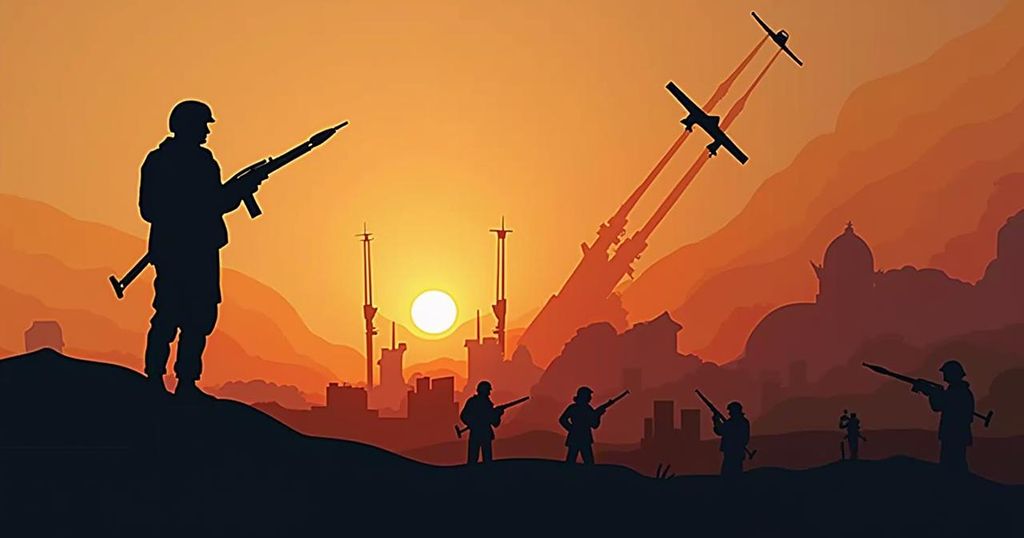Iran’s recent missile strikes on Israel represent a significant escalation of hostilities, aimed at restoring its deterrent capability after losses suffered by its proxies. The strikes targeted military installations rather than civilian areas, prompting an expected strong retaliatory response from Israel. Analysts speculate that Israel might target Iranian oil refineries or nuclear facilities, which raises concerns about regional stability and potential global economic impacts. Netanyahu’s leadership is now under scrutiny as he seeks to capitalize on military success against Hezbollah while simultaneously addressing challenges posed by Iran.
Recent missile strikes by Iran against Israel have heightened tensions in the region and could lead to significant shifts in political dynamics. On Tuesday night, Iran launched almost 200 long-range and ballistic rockets towards Israel, marking a bold attempt to directly confront its adversary following significant setbacks in its proxy engagements, particularly against Hezbollah in Lebanon. Sanam Vakil, a Middle East analyst, remarked, “Iran recognized that without trying to inflict damage and restore some deterrence, it would continue to get hit by Israel, and that’s what it is trying to achieve here.” This response from Iran appears to be a calculated move to reassert its influence as its primary proxies have suffered considerable degradation. Notably, the recent strikes targeted Israeli military installations rather than civilian areas. The Iranian Foreign Minister commented on the nature of the strikes, stating that the action was a defensive measure after an extended period of restraint to allow for a potential ceasefire in Gaza. Israeli Prime Minister Benjamin Netanyahu condemned the attacks as a significant miscalculation on Iran’s part, indicating that a retaliatory response from Israel was imminent. Ahron Bregman, an Israeli military analyst, highlighted the implications of such a response, suggesting that Israel’s potential targets might include vital Iranian oil refineries, which could have far-reaching effects on global oil markets. Furthermore, some within Israel’s political sphere are advocating for decisive military action against Iranian nuclear facilities, seeing it as an opportunity to incapacitate the Iranian regime further. Naftali Bennett expressed that this moment presents a rare opportunity for Israel to reshape the future of the Middle East by decisively targeting Iran’s nuclear ambitions. However, experts warn that any such military action may not significantly disrupt Iran’s nuclear capabilities, as they have fortified many facilities underground. Domestically, Netanyahu’s popularity appears to be recovering following recent military successes against Hezbollah. Initially criticized for his handling of prior attacks, he now has the chance to consolidate political support by adopting a strong stance against Iran. Nevertheless, analysts caution that Netanyahu’s decisions should not lead to overreach, which could jeopardize Israel’s tactical advantages gained thus far. The consensus remains that while Israel can respond forcefully, it cannot single-handedly alter the complex political landscape of the Middle East.
The recent Iranian missile strikes against Israel are significant as they represent a direct confrontation between the two nations following a period of conflict involving proxies like Hezbollah and Hamas. This escalation comes after losses suffered by Iranian-supported groups in the region, particularly in Lebanon and Gaza. The strikes on key military installations in Israel signify Iran’s attempt to restore deterrence and project its military capability in response to ongoing Israeli operations that have targeted both its assets and proxies. The backdrop to this situation is a long-standing rivalry characterized by periodic escalations and retaliatory actions, with both states grappling for influence and security in a tumultuous Middle East. The leadership dynamics within Israel, particularly concerning Prime Minister Netanyahu, also play a crucial role in shaping the response to such provocations. The interplay of regional power balances, public opinion, and military strategy will be central to understanding the ramifications of these strikes.
The Iranian missile strikes on Israel signal a notable escalation in tensions that have the potential to reshape political alliances and military strategies in the region. As Israel prepares to respond, the implications of its actions could resonate far beyond the immediate conflict, affecting global markets and regional stability. While Netanyahu’s government may see this as an opportunity to redefine its stance and restore public confidence, cautious voices within the analytical community warn of the perils of overreach. It remains to be seen how this confrontation will influence broader geopolitical relations and the internal dynamics of both nations involved.
Original Source: www.cbc.ca






